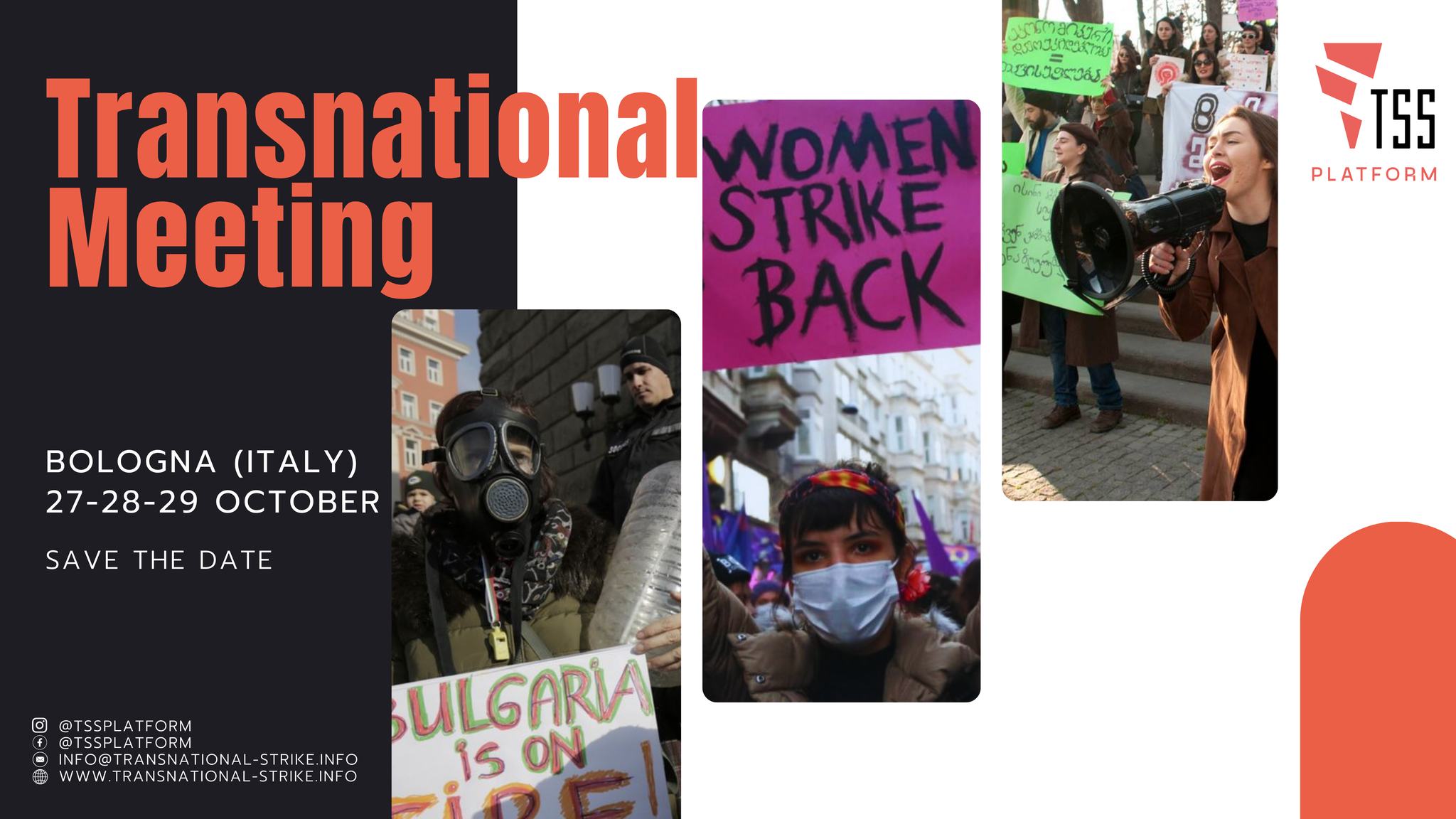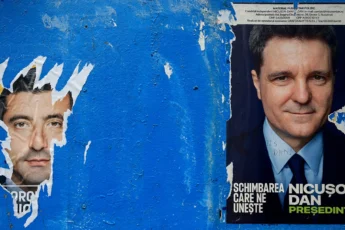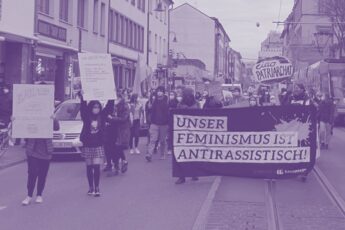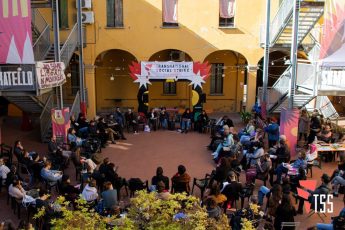
TSS MEETING IN BOLOGNA
27-29 OCTOBER 2023
Translations: Italian – German – French – Greek – Swedish – Slovenian
For the past year and a half, the war in Ukraine and its widespread consequences have impacted the spaces and possibilities of political organizing. In the wake of pandemic, a global crisis in social reproduction, and the escalating effects of the climate crisis, the consequences of war politics at a world scale are now being felt in the lives of migrants, workers, women and LGBTQI+ people well beyond the war zones. While fostering nationalism, the war highlights the prominence of what happens across borders. To resist and refuse the politics of war, we need to build a common horizon and face the question of what it means to organize transnationally. For these reasons, after the meetings in Sofia and Frankfurt, we call to meet again in Bologna on the 27-29 October.
WE LIVE IN NO ORDINARY TIMES
We live in no ordinary times. While millions of people struggle with higher costs of living and precarisation, war has kidnapped political imagination, making it even harder to give shape to projects of radical transformation. Yet, the very urgency of this moment demands that we become more daring and face the transnational processes we are enmeshed in. Whilst international solidarity adheres to the fixity of nation states as the basis of political reality, a transnational approach identifies the material processes, relations and struggles that cross the borders.
The attack on wages and working conditions today bears the face of the employer that we meet every day, but it is also part of the overall shift away from post-pandemic ‘recovery’, and towards the undercutting of social expenditure, diverting money towards supporting the military industry and war politics more generally. The restructuring of welfare, healthcare, and pensions means a daily struggle to make ends meet, but has at the same time the shape of a more general patriarchal and racist attack that marks our present. With different intensities, governments are both promoting motherhood as an allegedly natural destiny, obstructing freedom of abortion and contraception, and making it harder for working women to choose to have children. According to this widespread patriarchal logic, women’s labor is supposed to replace the dismantled welfare system, while women continue to be an essential part of wage labour. National and supranational institutions are turning a blind eye on domestic and sexual violence, and LGBTQ+ people are suffering from laws that openly attack and take away their freedom.
The palpable shape of racism is made visible in every migrant and descendant that is treated either as cheap labour or as a disposable life. At the same time however, it is rooted in the institutional decisions of the European Union and its states, which openly sends all migrants trying to reach Europe the message that they will be left to die. Meanwhile the EU is redefining itself through rearmament, the reconfiguration of border policies and ‘recovery’ plans. Rather than being a limit to nationalism, the EU at war is the protagonist of a strong resurgence of nationalism as the answer to poverty and the rising costs of living, paving the way towards an unprecedented advancement of far-right forces.
The climate crisis manifests as a series of catastrophic events that destroy people’s lives and homes: widespread floods and landslides have recently hit Emilia Romagna, the very Italian region we will be meeting in. But the climate crisis is not just about the increasing frequency of extreme weather events. It is the result of capitalist exploitation that shapes new fields of accumulation and struggle, where the “green agenda” is negotiated internationally, and is used to draw further lines of division and hierarchy throughout society and across the globe. We have only seen increasing profits and attacks on workers, whilst little of substance is done to prevent or mitigate the real risks of climate catastrophe.
FACING THE TRANSNATIONAL TO REGAIN POLITICAL IMAGINATION
Whilst we contend with the disruptive effects that pandemic and the war have had for political organising and social movements, the living struggles of workers, migrants, women, and LGBTQI+ people, scattered as they are, continue through acts of refusal and anger instigated in different moments across Europe and beyond. However, we see the difficulty faced by social movements to build tools that can empower and connect existing struggles and imagine new possibilities. We thus think that it is time to take a step forward with respect to the directions and possibilities that organizing transnationally reveals.
Whether we want to oppose a national reform, a multinational employer, an authoritarian, patriarchal and racist government or the exploitation imposed through European policies, we face the need to openly confront processes that go beyond our local territories, processes that fundamentally operate on the transnational dimension. We know that these processes hit at different paces and intensity, depending on the specific conditions people face. At the TSS meetings in Sofia and Frankfurt, we discussed the role of Eastern European and the Post-Soviet regions that function as laboratories for neoliberal experiments that were later repeated in Europe. We discussed the diverse impacts of the war in Ukraine on climate, migrant, and feminist struggles and different points of tensions and strikes arising in Europe.
In Bologna, we want to build a space that refuses the war and can serve to elaborate collective strategies for confronting the challenges and possibilities that the transnational dimension presents, to enlarge our political imagination and strength. Whilst transnational organization is the name of a problem that urges us to consider differences and contradictions, it also represents a necessary means to pursue radical change. Reading collectivelythe processes, dynamics, and differences that articulate common tendencies and fields of contestation is an essential part of the transnational initiative we need to build, and provides the opportunity to put into dialogue different struggles and subjects within a common project. Transnational organizing is neither a readymade solution to the problems that we face in our territories, nor limits itself to showing solidarity with one another. It is an essential practice to radically confront the processes that mark our political present and to refuse divisions along the lines and hierarchies drawn by our enemies. It is up to us to find and develop the forms and scope of transnational organizing that the present demands. For this reason, the meeting will be focused on discussing the novelty of the current conjuncture and calling for new strategies for the struggles ahead.
We will soon publish an outline of the meeting’s programme to focus our discussions on key questions. A call to contribute to the construction of the meeting will be released shortly. In the meantime, we invite you to register for the meeting in Bologna, Italy, from 27-29 October.
If you want to contribute to the preparation of the meeting write to info@transnational-strike.info
For information about registration and logistics of the meeting write to tssmeetingbologna@gmail.com





